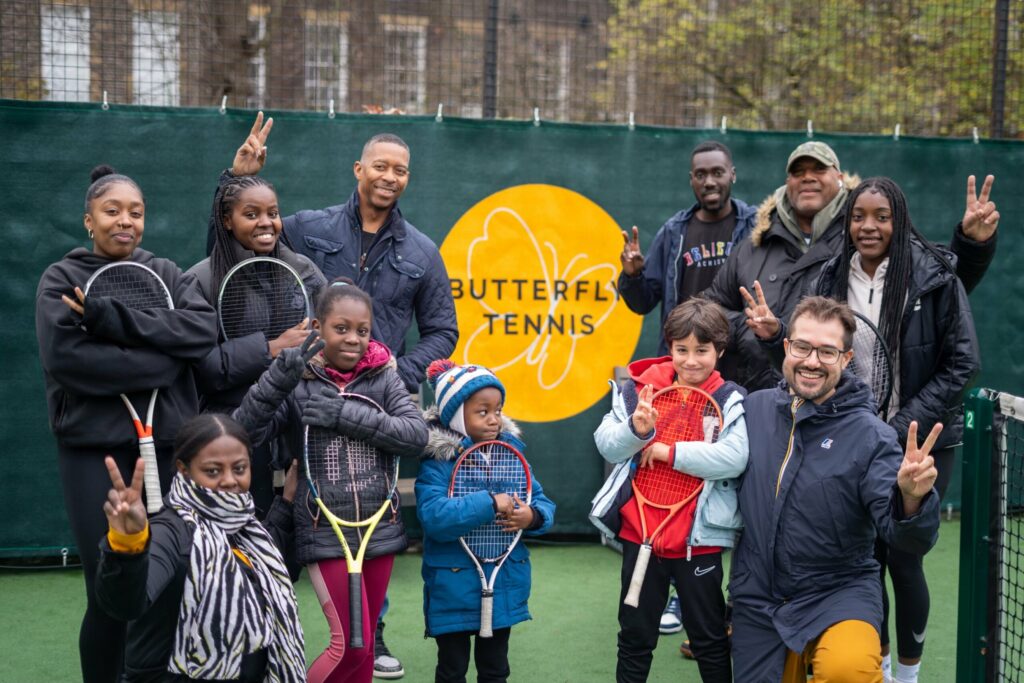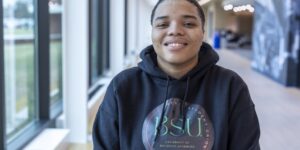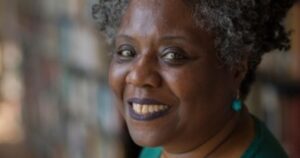At the onset of Wimbledon, we spotlight tennis coach Arum Akom, a champion for change in his cherished game
Arum Akom yearns for the day he’ll be in the Wimbledon player’s box, cheering for one of his athletes on Centre Court. Meanwhile, he’s committed to nurturing the next generation of tennis stars at The Butterfly Tennis Club in Camberwell, South London. Here, he runs a free scholarship program for local kids, coaches aspiring professional juniors, and spearheads his new diversity initiative, Black Tennis Mentors.
Tennis is now experiencing a global surge post-pandemic, and its demographics are shifting. Once considered a sport for the white-middle class, player numbers have risen by 33% in the US from 2019 to 2022, with black player participation increasing by 46%.
In the UK, a recent Lawn Tennis Association (LTA) study indicates tennis as a sport with a balanced gender ratio, 40% of players being female. However, female coaches only make up 24% of all accredited coaches. Similarly, players from diverse ethnic backgrounds constitute 16%, but coaches and officials from the same background only account for 4% and 3% respectively.
Akom seeks to correct these disparities. He understands the challenges faced by black players and those from lower socio-economic backgrounds. He is fortunate to have grown up near Burgess Park tennis courts, known for one of the UK’s largest community tennis programmes. “I was one of those children who wanted to play regularly,” he shares. “I was lucky to be at Burgess Park where they offered us free or reduced-cost tennis for most of my career.”
When the Butterfly Tennis Club aimed to reflect its on-court community’s diversity in 2020, they approached Akom, not just because of his impressive resume but also for his lived experience. His credentials include a sports scholarship to the University of Roehampton, an MSc in Sports Management from the University of East London, and LTA coaching qualifications levels 1, 2, and 3.

Akom’s first step was to establish a bursary programme for children from lower socio-economic backgrounds, offering free tennis after school and during holidays. The costly nature of tennis, from lessons and equipment to travel expenses, can be a deterrent for many. Financial support for the programme comes from membership, fundraising, and bodies like Sport England and the LTA. Akom forgoes big-name apparel deals, choosing instead to partner with footballer Reece Placid’s brand Believe & Achieve, whose message aligns with his personal platform, Project AA (‘Accomplish Anything’). His work landed him the title of Game Changer in the Community at the inaugural Tennis Black List awards in 2023.
Akom never aspired to turn pro himself. “Never. I think that’s because I understood from an early age the challenges I faced. Tennis was just a social sport for me, and I was content with that.” However, he is ambitious for his own players, dedicating two hours a day, five days a week, to train eight-year-old protégé Nazrah. He applies the knowledge acquired from his mentor, high performance coach Barry Bartley. They refer to this knowledge transfer as a “conveyor belt”. Together, they’re inching closer to their end goal.
“It’s time for champions from ethnically diverse backgrounds to be produced in the UK,” states Akom. “It hasn’t been done, and it needs to be done. That’s why I’m working with players like Nazrah. We want to show that we can produce because it’s possible.”
The US is ahead in this regard, thanks to the ‘Venus and Serena effect’, and a new generation of talent including Ben Shelton, Frances Tiafoe and US number one Coco Gauff. Akom cites The Black Girls Tennis Club and the Washington Tennis Education Foundation as pioneers. He firmly believes that representation is crucial. Hence, his modelling gigs with Fila and Lacoste are efforts to change the face of tennis.
“It’s time for champions from ethnically diverse backgrounds to be produced in the UK. It hasn’t been done, and it needs to be done,” he reiterates.
Akom shares a deep connection with Nazrah and her mother, thanks to their shared East African roots. “We have a relationship that goes beyond the tennis court. We eat similar foods, have a similar culture.” Last year, Akom took them to Wimbledon, joining the famous queue at 5am. “Imagine that: the mum coming from Ethiopia, only hearing Wimbledon on the radio when she was a kid, always dreaming about going.”
Akom insists that seeing others like you, whether at the grassroots or high-performance level, can be motivating. He recently delivered the new Prime Video LTA Youth Girls sessions at the club, resulting in increased female participation. Meanwhile, Black Tennis Mentors, co-founded with Jabilayh Asante, is off to a good start, working on a new Black and Afro-Caribbean tennis society in north London and with Asante on her mobile club Back It.
“I don’t know where I want Black Tennis Mentors to go yet. The reason I don’t know is because there’s so much it can do, and it involves other people,” he says. “It’s not what Arum wants out of it; it’s what everybody wants out of it.” It all begins in the community.





